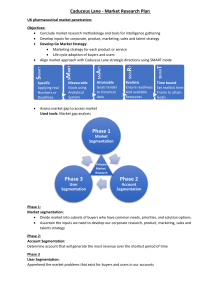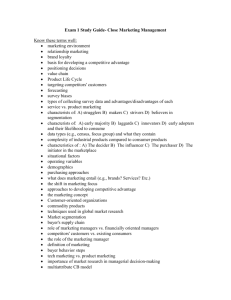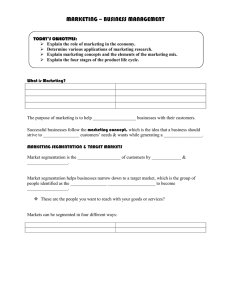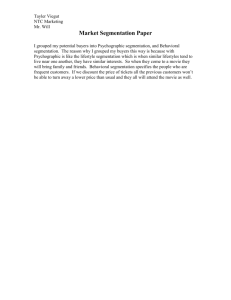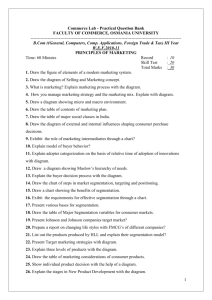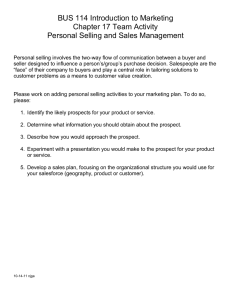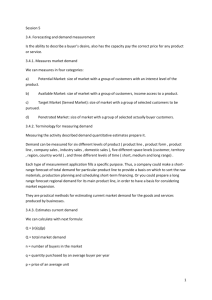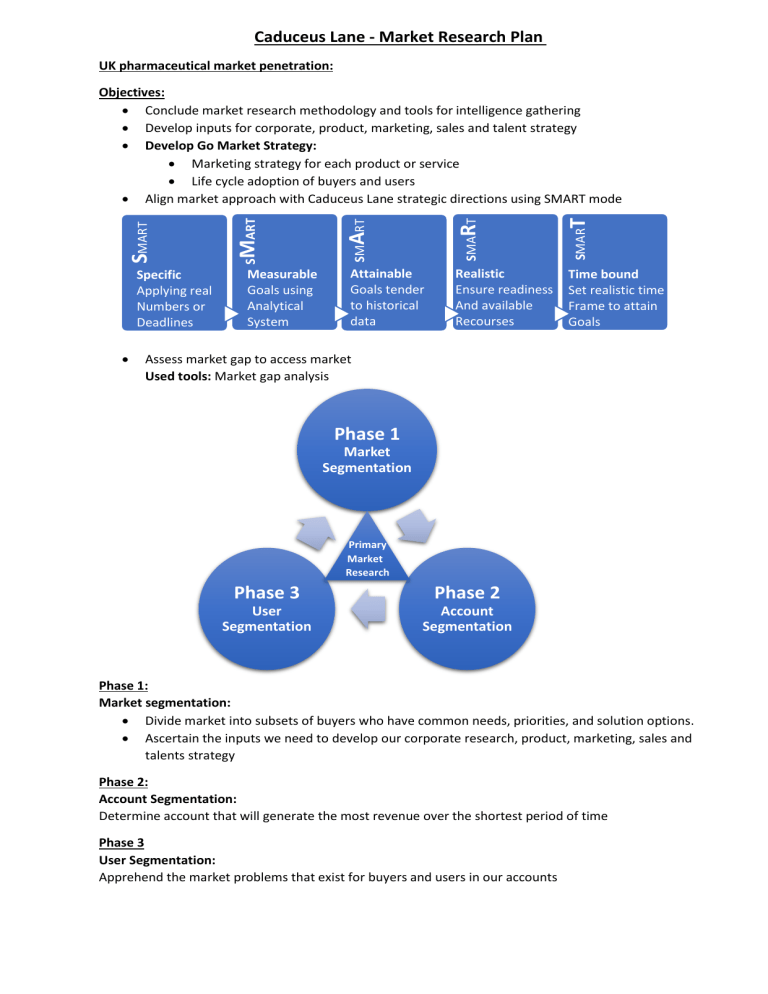
Caduceus Lane - Market Research Plan UK pharmaceutical market penetration: T Realistic Ensure readiness And available Recourses Time bound Set realistic time Frame to attain Goals A SMAR R Attainable Goals tender to historical data SMA T Measurable Goals using Analytical System MART SM RT Specific Applying real Numbers or Deadlines S SMART Objectives: Conclude market research methodology and tools for intelligence gathering Develop inputs for corporate, product, marketing, sales and talent strategy Develop Go Market Strategy: Marketing strategy for each product or service Life cycle adoption of buyers and users Align market approach with Caduceus Lane strategic directions using SMART mode Assess market gap to access market Used tools: Market gap analysis Phase 1 Market Segmentation Primary Market Research Phase 3 Phase 2 User Segmentation Account Segmentation Phase 1: Market segmentation: Divide market into subsets of buyers who have common needs, priorities, and solution options. Ascertain the inputs we need to develop our corporate research, product, marketing, sales and talents strategy Phase 2: Account Segmentation: Determine account that will generate the most revenue over the shortest period of time Phase 3 User Segmentation: Apprehend the market problems that exist for buyers and users in our accounts Phase1: Market segmentation: Dividing targeted market into subsets: Buyers With common - Needs - Priorities - Solution options Market Analysis Quantitative state Market size, forecast and growth rate Market unfolding industry’s trends Market needs and unceasing change Laws, regulations, compliances Specify registration channels Adaptation of apposite solutions and services to ensure alignment with market Caduceus Lane brand analysis for alignment externally and internally Analysis TOOLS Competitors SWOT analysis Competitors' analysis Key competitors targeting our buyers Services and tools Data Analysis Competitors' time span of dealing with key buyers Used marketing strategies Competitors go to market strategy Define types of used approaches: Product Price Customer Intimacy Competitor's strength and weakness Opportunities and threats in the market Used tools: Competitors analysis SWOT analysis Develop Go Market Strategy: Methods of generating demand to sell solutions, products and services: Marketing strategy for each product or service Life cycle adoption of buyers and users Phase 2: - Account Segmentation Determine accounts’ potentials to generate the most revenue over the shortest period of time Data Analysis Be more specified to customers prospects. Understand customer market’s obstacles and complications Fortitude of the following: Accounts within the market 1. Designation of ideal customer profile and description defining ideal customer and prospect 2. Each customer score relatively to ideal customer profile 3. Potential spend for ideal customer or prospect and cost for acquiring each customer 4. Lifetime value for each customer- Lower cost for acquiring higher lifetime value 5. Account segmentation and prioritization 6. Customer phases for making purchase decisions 7. Customer purchase decision making guidelines 8. Customer services and products’ user problems Account market analysis Identify key account's segmentation Key accounts Preferable marketing approach and concentration Feedback on current marketing agencies Expectations and future aspirations in marketing Estimated marketing budget Identify best fitting product or service for each account Identify where alignment reside with key accounts Used tools: Customer satisfaction matrix On desk marketing research Design survey for intelligence gathering Buyer profiling template Phase 3: - User Segmentation: Understanding of the market complications present for users in our accounts User market analysis Users by geographical regions Purchase decision making process Types of digital resources influencing user administrators during purchase process Frequency of purchase decision making Purchasing budget forecast User requirements, quality standards and regulation compliance Products’ storage Requirements Used tools: On desk marketing research Design survey for intelligence gathering User profiling template Primary market research: 1- Customer research 2- Prospect research 3- Competitive research 1- Customer research Data Intelligence: Customer satisfaction matrix Executive mapping- Support gather virtuous customer research on key accounts 2- Sharing of product roadmaps and OEM relationship How customers cooperating and responding to sales Caduceus Lane conducting Prospect research Methods and tools 1- Win loss interviews -Are we solving prospects problems- Define alignment position with prospect -Interview questions in regard of buyer buying process and map it into our marketing and sales processes 2- Social Listening Determine our position on social media where customers and prospects exist and what are they saying 3- Developing Persona Buyer persona: Buyer persona is typically part of the buying decision making. Conduct buyer’s data gathering and research and interviews to understand their objectives, obstacles, challenges, strategic initiatives, and key performance indicators Fortitude of the following: What buyers care about? Identify decision makers when making purchase decision Buyer values when engaging with our teams How do I know them better than they know themselves Develop BPM (buyer persona map) Buyer’s journey for making buying decisions and go through stages User persona: Fortitude of the following: What users are trying to get done? What prevent users from completing their purchase decision? What alternatives solutions exists for users to address their needs? What users value the most? What products and services to be best in its class to succeed in our industry? 3- Competitors research: Gather competitive intelligence: What are our competitor’s strategies? How do they win? Conduct interviews and determine how do they market? What content do they offer?
